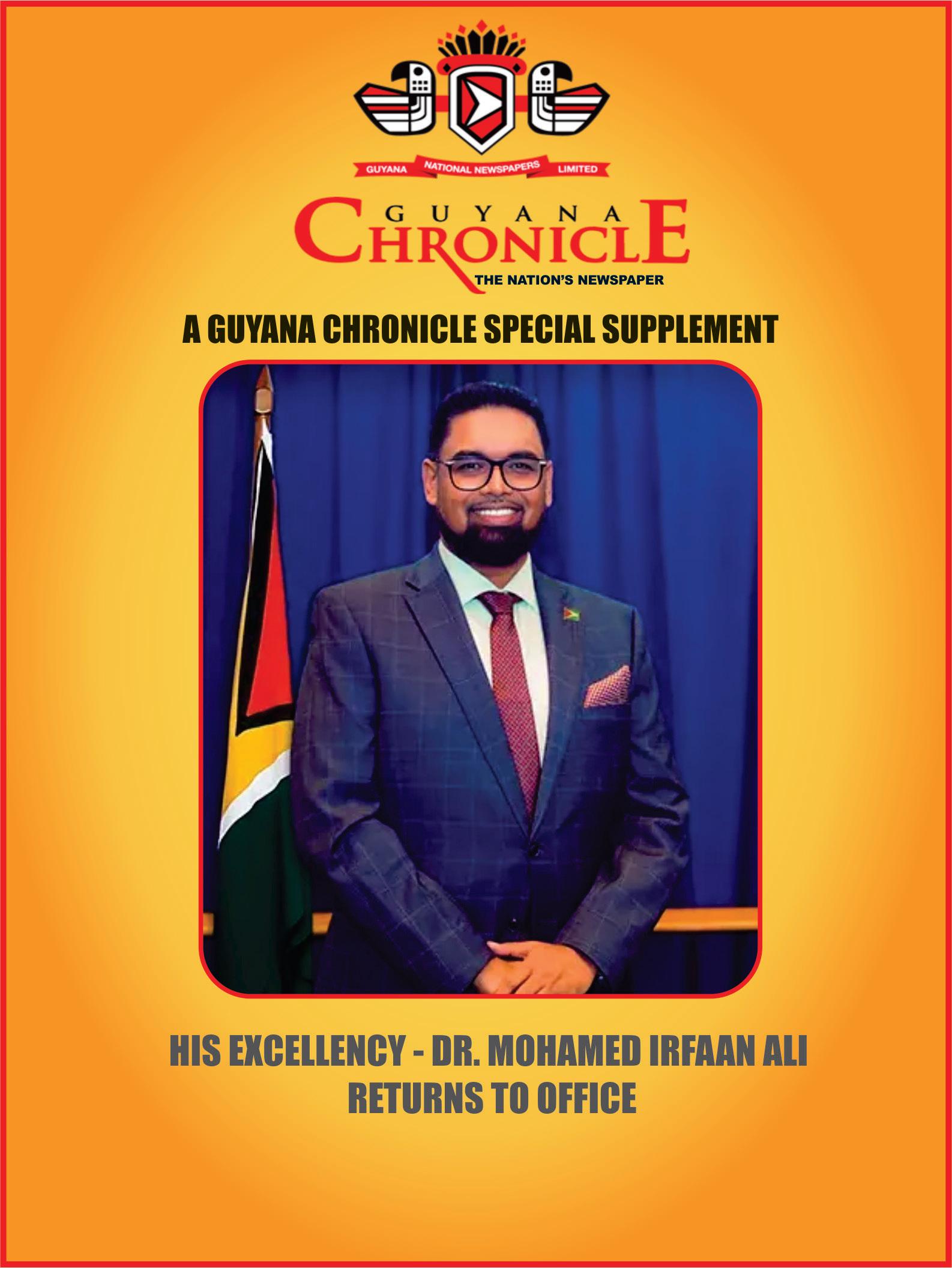
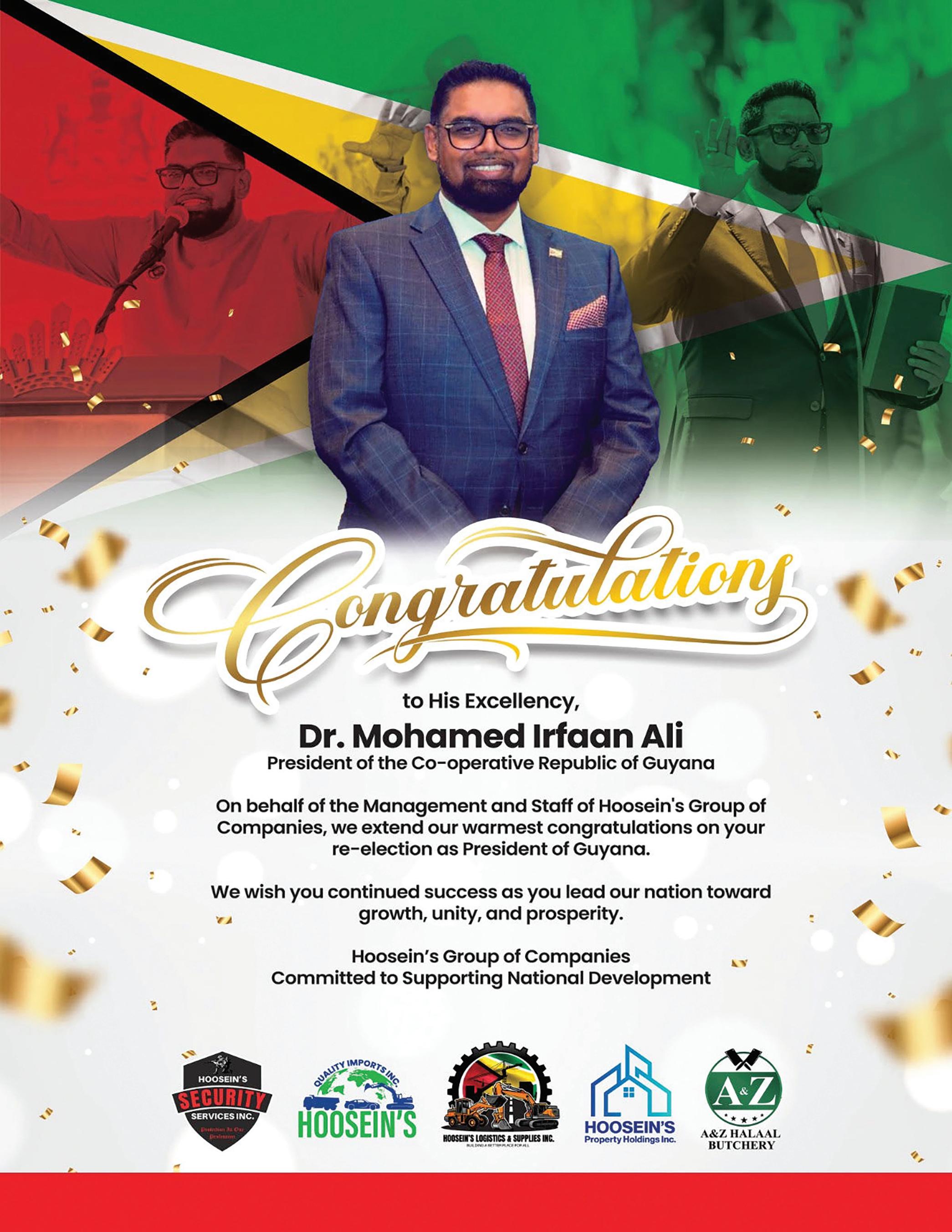



In his first major act since being sworn in for a second term as Guyana’s ninth President, Dr. Irfaan Ali on Monday last appointed Brigadier (Ret’d) Mark Phillips as Prime Minister and Dr. Bharrat Jagdeo as Vice-President, describing both men as “exemplary” leaders whose decades of service make them ideally suited to help guide the nation’s next chapter of development.
The appointments, made in accordance with Articles 101 and 102 of the Constitution, came just one day after President Ali’s inauguration. At a brief but symbolic ceremony at the Office of the President, he underscored the depth of experience and integrity that the new Prime Minister and Vice-President bring to the administration.
“These appointments are evidence of placing the reins of our nation’s development in the most capable hands; hands that have been tried, tested and proven in the annals of public service,” the President said.
President Ali highlighted the distinguished military career of Brigadier Phillips, who served as Chief of Staff of the Guyana Defence Force (GDF) between 2013 and 2016 before retiring after more than 36 years of service.
“His name is synonymous with duty and public service. When called to serve, he has never faltered. He embodies the spirit of discipline, loyalty, and steadfast commitment,” the Head of State remarked.
Phillips’ journey to leadership reflects both academic and professional excellence. A former acting teacher and laboratory analyst with GUYMINE, he joined the GDF in 1980 and went on to receive elite training at the Royal Military Academy Sandhurst in the United Kingdom and the United States Army Command and General Staff College. He also trained in Brazil, becoming a Special Forces Officer and an accomplished parachutist.
Over his career, he held several tactical and operational appointments before rising to the rank of Brigadier and Chief of Staff. His decorated service earned him the Military Service Star (MSS),
Guyana’s highest military honour. Academically, he holds a Master of Science in Public Sector Management, a Bachelor of Social Sciences in Public Management, and multiple postgraduate diplomas in defence and security studies.
Turning to Vice-President Jagdeo, President Ali praised his decades of political and economic stewardship, calling him a leader whose “story is one of unparalleled achievement.”
Dr. Jagdeo first served as Minister of Finance before ascending to the presidency in 1999, a position he held until 2011. As President, he is credited with stabilising and growing Guyana’s economy, advancing infrastructure, and laying the groundwork for the prosperity Guyana is now experiencing. Notably, he was the first Head of State to step down in compliance with the two-term limit law, which he himself enacted.
“Dr. Jagdeo, your continued service is a gift to the nation, and we are all beneficiaries of your wisdom and boundless energy,” President Ali said. He added that Jagdeo’s guidance has been instrumental in his own leadership over the past five years.
Today, Jagdeo also serves on several international platforms where he advocates for sustainable development, climate change mitigation, and green energy—positions that continue to enhance Guyana’s voice in global affairs.
For President Ali, the appointments reflect more than political continuity; they signal his administration’s commitment to stability, competence, and experience as Guyana navigates a period of rapid transformation fueled by its growing oil and gas sector. By entrusting two seasoned leaders with key roles in government, Ali has made clear that he intends to balance fresh vision with proven leadership.
As Guyana begins a new political term, Phillips and Jagdeo—one a soldier turned statesman, the other an economist turned global advocate—stand as central pillars of the administration’s pledge to lead the nation forward.


President Dr. Irfaan Ali has reaffirmed his administration’s commitment to strengthening Guyana’s international partnerships as part of a wider strategy to safeguard national sovereignty and advance longterm development.
Speaking at the weekend after taking the oath of office following the September 1 general and regional elections, President Ali underscored that global collaboration would be central to Guyana’s development path.
“I remain committed to engaging our international partners in ways that safeguard Guyana’s sovereignty and advance our national interests. We will strengthen co-operation where it brings tangible benefits to our people, while ensuring that our resources and opportunities are managed to secure prosperity for this and future
generations,” the Head of State declared.
Guyana’s international profile has grown significantly in recent years, fuelled by its expanding oil and gas sector, global leadership on climate and biodiversity preservation, and the ongoing border controversy with neighbouring Venezuela.
While stressing that Guyana seeks peace and constructive engagement, President Ali made clear that the country would continue to defend its territorial integrity with “quiet confidence in the law and a steady strength of unity.”
“Just as efficiency, integrity, and service must define how government works at home, so must collaboration and co-operation define how we engage abroad,” he said.


On Monday, President Ali hosted United States Deputy Assistant Secretary of War, Joseph M. Humire, at State House, where discussions centred on defence and security cooperation, including training programmes. The meeting, he noted, reinforced Guyana’s longstanding collaboration with Washington while exploring avenues for expansion.Beyond the US, Guyana has steadily broadened its international partnerships. Ties with the European Union (EU) have deepened through joint commitments to sustainable forest management, climate action, and trade, including a landmark Forest Partnership MoU. Regionally, Guyana has integrated into programmes with Brazil and Suriname.
The government has also expanded relations with Brazil, Mexico, and the Dominican Republic, focusing on energy security, investment, and private-sector collaboration. Relations with India have grown stronger as well, with cooperation spanning renewable energy, sustainable development, and high-level diplomatic exchanges.
Highlighting the role of the Guyanese diaspora as a vital development partner, President Ali outlined plans for deeper, structured engage-
ment to support the country’s transformation.
“We recognise the vast potential of our Guyanese diaspora to be partners in the transformation of our nation. Therefore, through sustained and meaningful engagement, we will keep our diaspora informed, encourage their investments, and create avenues for participation in key sectors by tapping into their expertise, capital, and networks,” he explained.
The President emphasised that contributions from the diaspora—ranging from entrepreneurship and technical skills to advocacy and international linkages—were central to building resilience and national development.
“Furthermore, our worldclass education and healthcare systems will be fully accessible to members of our diaspora, providing yet another reason for them to maintain and deepen their ties with home,” he added.
With Guyana positioned at the intersection of rapid economic transformation and growing geopolitical interest, President Ali has signalled that his government’s approach will blend peace and diplomacy with assertive defence of sovereignty, while harnessing the potential of both global partners and the diaspora to drive national progress.
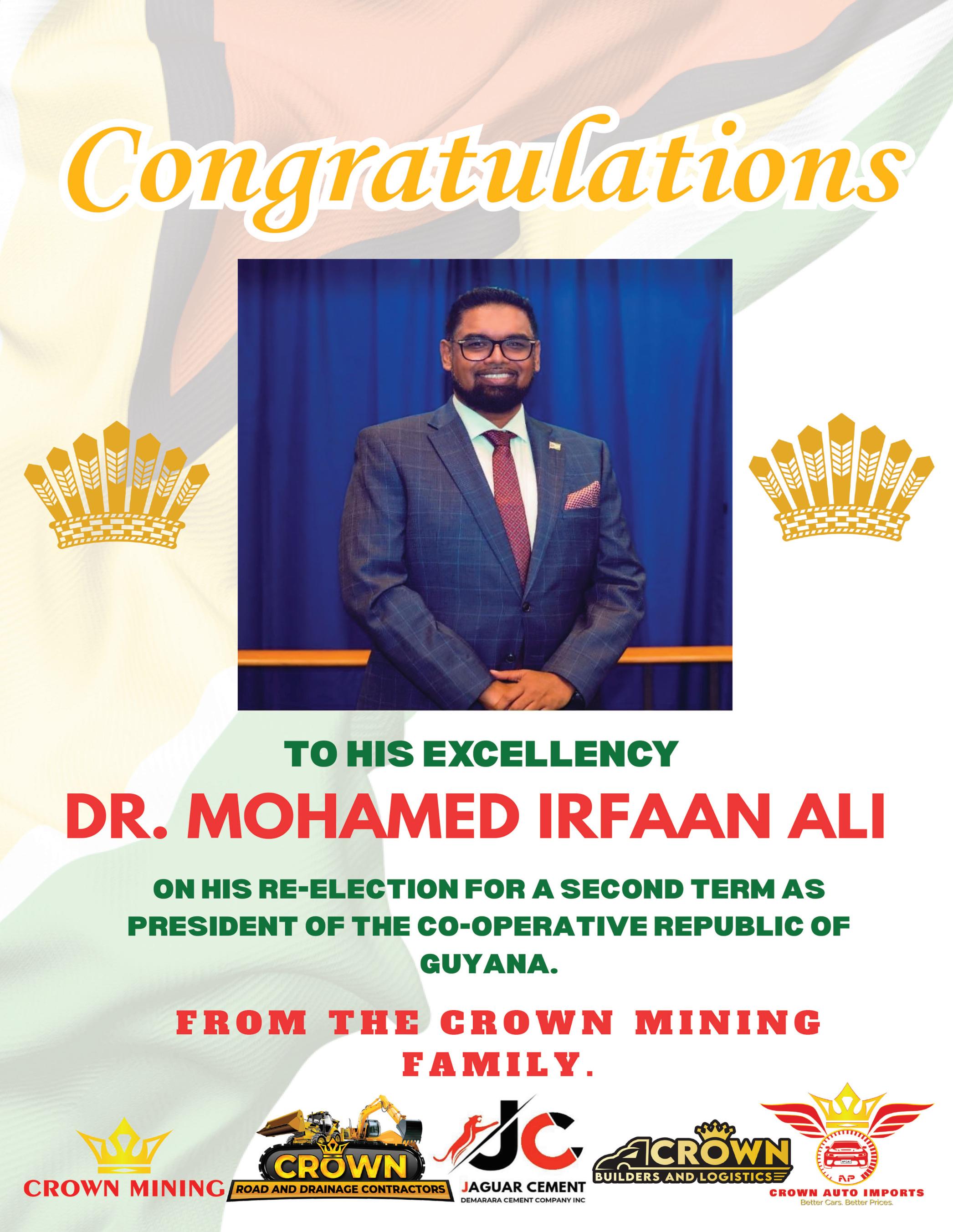




Work on Guyana’s transformative Gas-to-Energy (GtE) project moved into a new phase this week with the pouring of the first gas turbine foundation, marking a major milestone in the construction of the 300 MW power plant and Natural Gas Liquids (NGL) facility at Wales, West Bank Demerara.
The development was confirmed by Head of the GtE Task Force, Winston Brassington, during an update to President Dr. Irfaan Ali on Monday. In a subsequent
post on his official Facebook page, President Ali noted that the concrete pouring exercise took place on the night of September 9, and that over 300 persons had already been employed on the project.
Brassington also reported that an additional 100 workers would be engaged within 30 days, while concrete pouring for the remaining turbine foundations would be completed in that same period.
Phase One of the project, being executed by Lindsayca Guyana Inc., covers the construction of a 300 MW combined cycle plant and NGL facilities. Phase Two envisions another 300 MW plant and NGL facility, for which seven submissions had been received from interested firms. According to Brassington, discussions were underway to finalise pre-qualification before moving immediately to Engineering, Procurement, and Construction (EPC) and financing arrangements.
The wider project includes the
construction of a 200-kilometre pipeline to bring natural gas from the Liza Destiny and Liza Unity Floating Production Storage and Offloading (FPSO) vessels offshore to Wales. From there, the pipeline will extend a further 25 kilometres to the NGL plant.
The GtE project has been described by government officials as one of the most significant infra-
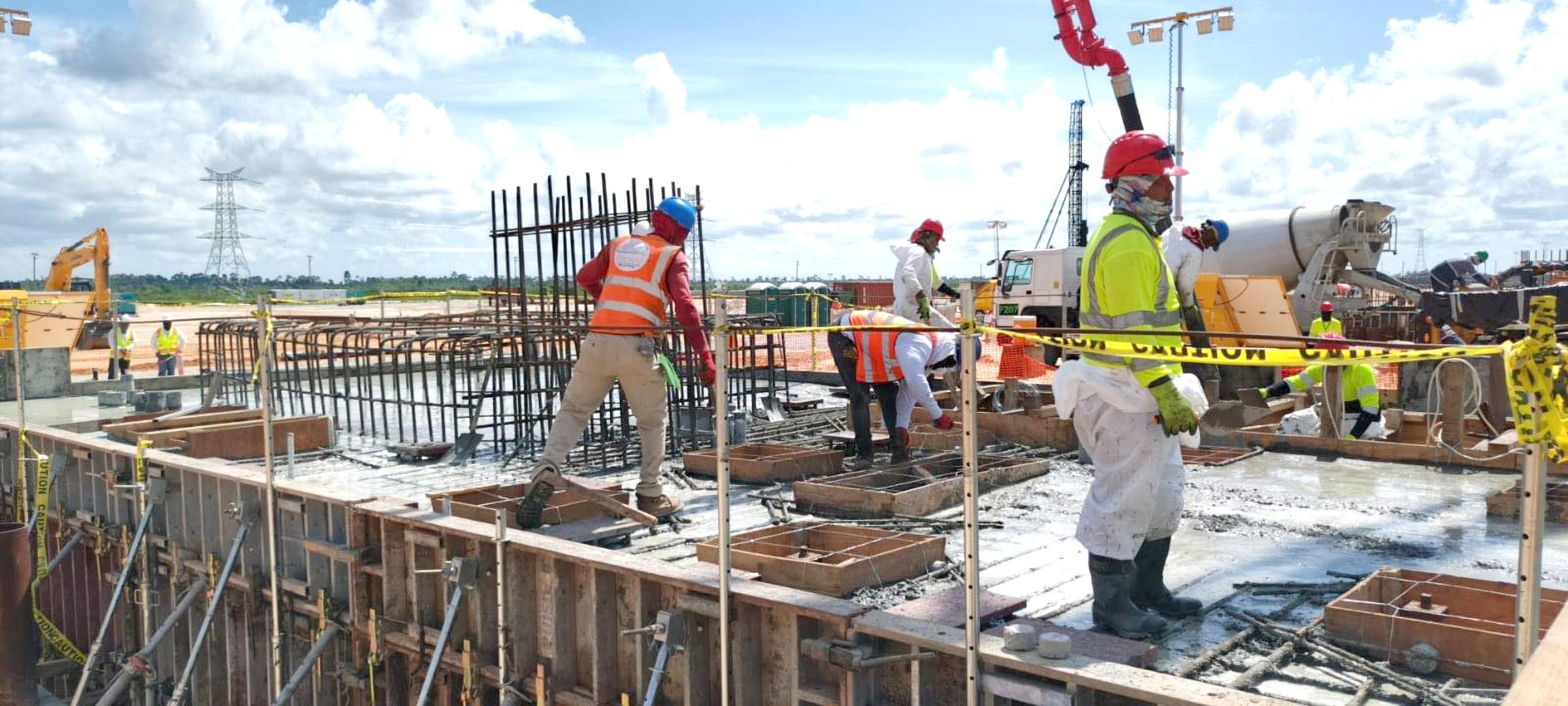
structure undertakings in Guyana’s history. Once operational, it is expected to slash the cost of electricity by 50 per cent, making power more reliable and affordable for households and businesses alike.
Vice-President Dr. Bharrat Jagdeo had previously underscored the administration’s determination to see the project completed, even if it required state financing. “The project will be done, even if it means funding it from our own budget,” Jagdeo said.
Government has also highlighted that the GtE project would serve as a catalyst for economic diversification, creating jobs and attracting investment in downstream industries such as manufacturing and agro-processing.
The initiative is also being closely watched across the Caribbean, as Guyana positions itself not only as an emerging oil and gas producer but also as a driver of regional energy security. By transitioning part of its natural gas resources to onshore power generation, Guyana is seeking to reduce dependence on expensive imported fuel while building the foundation for a more sustainable, competitive economy. With the first turbine foundation in place, the project has shifted from planning to visible execution—signaling that Guyana’s long-touted energy transformation is now firmly underway.

Unveiling an ambitious agenda for his second term in office, President Dr. Irfaan Ali has reaffirmed his government’s commitment to accelerating agricultural modernisation and regional trade with the ultimate goal of reducing Guyana’s—and the wider Caribbean’s—heavy reliance on imported food.
Speaking during his inauguration at State House, Georgetown, on Sunday, following the September 1 general and regional elections, President Ali returned as the CARICOM Head of Government with responsibility for agriculture, a position he has used in recent years to drive the region’s 25 by 2025 initiative, which seeks to slash CARICOM’s US$6 billion annual food import bill by a quarter within the next two years.
“We'll accelerate food security and logistics, modernising agriculture and agro-processing, opening new shipping and air links, and driving down the region's import bill so Caribbean tables are fed by Caribbean farms,” Dr. Ali declared.
The Head of State also signaled TURN TO PAGE 13A
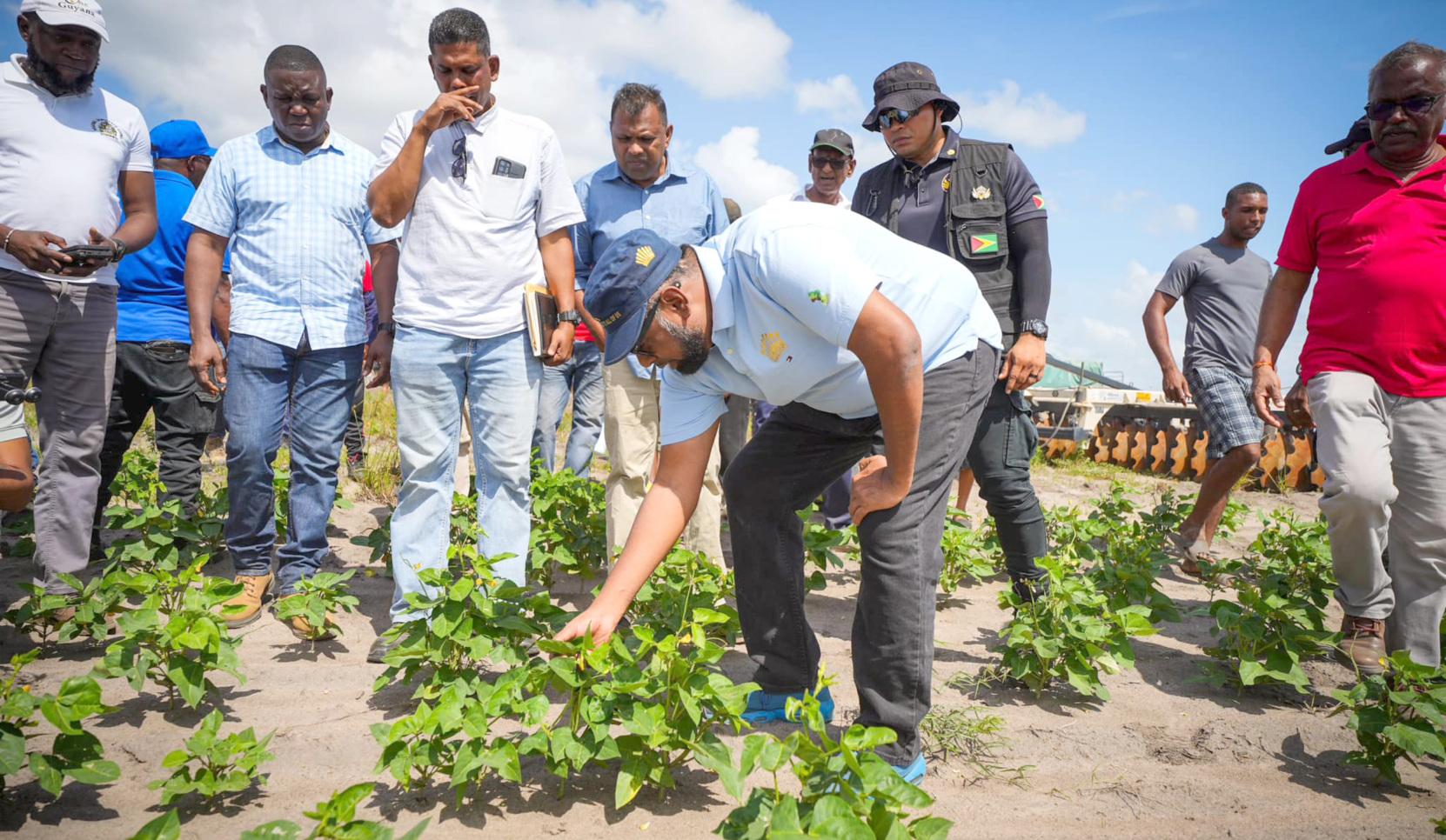

Unveiling what he described as one of the most pivotal eras in Guyana’s history, President Dr. Irfaan Ali has pledged to transform the nation into a model of prosperity, sustainability, and global relevance over the next five years. Speaking shortly after taking the oath of office on Sunday, the Head of State declared that ambition would be converted into action, and action into lasting transformation.
“In the next five years, we will convert ambition into action and action into transformation. We will not speak in half-measures, and we will not hesitate to deliver,” President Ali told the gathering, emphasizing that Guyana now stands at a historic crossroads with unprecedented resources, leadership, and international goodwill.
At the heart of this transformative agenda is the concept of Guyana as a “Rising Frontier”—a nation where
oil, agriculture, and minerals drive prosperity, while innovation, resilience, and environmental stewardship secure a sustainable future.
The President urged citizens, private sector leaders, civil society, and international partners to unite behind a shared vision for national development.
A central pillar of the President’s plan is seamless connectivity, both within Guyana and across regional borders. He outlined sweeping plans for nationwide infrastructure projects to bridge Guyana’s ten administrative regions, alongside digital infrastructure upgrades, the development of Silica City, and the establishment of a shipping and logistics hub linking Brazil and CARICOM.
“Critical elements of our plans for Guyana by 2030 in-

clude seamless infrastructure between every region, digital infrastructure, advancing our new smart city, Silica City, and a shipping and logistics hub… creating new markets and opening up new opportunities,” President Ali explained.

While reaffirming the central role of oil and gas in the nation’s economic engine, the President underscored that Guyana’s future cannot rest on petroleum alone. He
pledged to expand exploration under stronger Production Sharing Agreements while channeling revenues into broader development goals.
“Our oil and gas sector will continue to grow, expanding production and rev-
enue for our people. But why stop there? … the wealth is truly for the people,” he said. Alongside oil and gas, President Ali stressed that traditional sectors—mining, agriculture, fisheries, and forestry—will be strengthened to maintain jobs and stability, while new growth poles will be cultivated. These include world-class tourism, a thriving blue economy, competitive manufacturing, cutting-edge ICT, and knowledge-based industries.
President Ali also placed heavy emphasis on sustainability, noting that Guyana’s globally recognized environmental credentials will be preserved and enhanced. From manpower planning in labour markets to food security in agriculture and sustainable forestry practices, the President said technology and innovation will be TURN TO PAGE 12A


President Dr. Irfaan Ali on Saturday held his first official meeting with Surinamese President Jennifer Geerlings-Simons on Saturday in Nickerie, Suriname, where talks were centre on the transformative Corentyne River Bridge project, energy cooperation, and a wider range of bilateral priorities.
The four-hour engagement served as a critical step in advancing flagship joint initiatives between the two neighbours.
The meeting comes just days after Suriname’s Foreign Minister Melvin Bouva travelled to Georgetown to attend Dr. Ali’s second-term inauguration on September 1, where he also held discussions with Guyanese officials.
President Ali has described the Corentyne River Bridge as a game-changing project for Guyana, Suriname, and the wider region, but stressed that financing
arrangements remain to be finalised.
“That is part of what we’re discussing; the financing mechanism, how it will be structured and those kinds of things. That is what has to be finalised,” the President said earlier this week, noting that both governments are moving quickly to resolve outstanding issues.
The 3.1-kilometre bridge, to be constructed by the China Road and Bridge Corporation, will connect Moleson Creek in Guyana to South Drain in Suriname, with a landing point on Long Island in the Corentyne River. Engineered to allow passage for ships up to 47,000 deadweight tonnes, it will feature a 100-metre horizontal clearance and a 43-metre vertical clearance, ensuring that maritime activity continues uninterrupted.
Beyond improving

cross-border travel, the bridge is expected to open new trade routes, strengthen ties with Brazil, and unlock wider South American markets for both Guyana and Suriname. Officials have also floated plans for Long Island to become a duty-free commercial and tourism hub,

with proposed developments including hotels, shopping malls, farmers’ markets, entertainment centres, and recreational spaces.
The bridge project is only one dimension of the growing Guyana–Suriname partnership. Both governments have expressed strong interest in joint exploration and production of natural gas, as well as in advancing energy security and industrial competitiveness.
In a meeting with Foreign Minister Bouva and other Surinamese officials earlier this week at State House, President Ali also highlighted
areas of collaboration beyond infrastructure.
“Discussions focused on Guyana’s commitment to the Corentyne River Bridge project; collaboration with Suriname to resolve issues affecting fisherfolk; improving the efficiency of the Guyana–Suriname ferry system; and exploring joint investment opportunities,” the President said in a Facebook update.
Saturday’s face-to-face meeting will mark the first engagement between Dr. Ali and President Geerlings-Simons since her election, setting the stage for a new chapter in Guyana-Suriname relations.
For both nations, the stakes are high. The Corentyne River Bridge and associated projects are envisioned not only as symbols of closer cooperation, but also as anchors for regional integration—linking the Caribbean Community (CARICOM) to South America and fostering greater economic resilience.
As the financing structure and governance of the bridge take shape—likely under a Special Purpose Vehicle combining national and international investment—leaders on both sides are positioning the project as a landmark in the region’s drive for connectivity, growth, and shared prosperity.
critical drivers of progress.
“As we consolidate our position as global leaders in the fight against climate change, managing the forestry sector in a manner that maintains our environmental credentials will be key,” he said.
Throughout his address, the President framed his
vision as one that cannot be realized by government alone.
He called on citizens, businesses, civil society, and international partners to collaborate in shaping a diversified economy and building a stronger, more resilient Guyana.
“We are not a one-sector nation. We are building a diversified economy that will generate jobs, raise incomes,
and secure prosperity,” he asserted.
As Guyana stands on the cusp of rapid transformation, President Ali’s agenda sets an ambitious path toward reshaping the nation’s economy, infrastructure, and global standing—anchoring Guyana not only as a rising frontier but also as a leader in sustainable development for decades to come.

President Dr. Irfaan Ali on Wednesday convened a high-level meeting with key stakeholders from Guyana’s financial sector, underscoring the government’s commitment to modernising banking services and aligning them with its broader digital transformation agenda.
The discussions, held at the Office of the President, focused on addressing persistent challenges faced by citizens in accessing financial services and mapping a clear path for commercial banks to accelerate digitalisation in step with government initiatives.
“Today, I engaged stakeholders from the financial sector to discuss modernising the banking sector to address ongoing concerns citizens face and to discuss plans to ensure commercial banks keep pace with the government in implementing digital transformation,” President Ali said in a post shared on his official Facebook page.
Attendees included senior representatives from major commercial banks, the Governor of the Bank of Guyana, Dr. Gobind Ganga, Head of the Private Sector Commission Gerald Gouveia Jr., and other influential figures in the financial industry. The stakeholder group is expected to submit a comprehensive report within six weeks, detailing the sector’s needs and outlining steps required to realise the government’s vision for a digital economy. “The stakeholder group is expected to

present a report in six weeks outlining what the financial sector requires to realise our vision for a digital economy,” President Ali noted.
The meeting comes amid a broader push by the People’s Progressive Party/Civic (PPP/C) administration to leverage technology for economic growth and improve ease of doing business. A critical element in this strategy is the modernisation of lending practices through recent legislative reforms. In 2024, the government enacted the
FROM PAGE 9A
Moveable Property Security Act and established an Electronic Collateral Registry. These reforms allow businesses to use a wide range of moveable assets—including equipment, vehicles, inventory, receivables, and even intangible property—as collateral for loans, expanding access to capital beyond traditional real estate-backed financing.
Minister in the Office of the President with responsibility for Finance and the Public Service, Dr. Ashni Singh, highlighted
the significance of this shift, noting that it opens doors for hundreds of thousands of entrepreneurs and small- and medium-sized enterprises (SMEs) that previously lacked sufficient collateral. “The banking sector has historically been conservative, erring on the side of caution, which is not necessarily a bad thing. We want strong banks and strong balance sheets… But there is room for the banking sector to be more aggressive in providing financing to the Guyanese private sector,” he said.
Dr. Singh also acknowledged that while some banks have begun to adopt these mechanisms, the pace of adoption remains slower than necessary, particularly in a rapidly growing economy where access to finance continues to constrain entrepreneurial growth.
The meeting with financial sector leaders represents a critical step in Guyana’s drive toward a digital economy, part of the government’s broader “Digital Guyana” agenda. By modernising banking practices, embracing technology, and leveraging legislative reforms, the administration aims to create a more inclusive, efficient, and service-oriented financial system that supports investment, innovation, and sustainable economic growth.
that Guyana will continue to champion energy security and competitiveness by leveraging its resources to expand manufacturing and create resilient, cleaner energy systems. “Our purpose in CARICOM is practical and people-centred: to make this single market work for ordinary families with cheaper energy, faster payment and roaming, recognisable skills across borders, and scholarships and apprenticeships that open doors for youth,” he said.
President Ali placed strong emphasis on building resilience in the face of global and environmental challenges, outlining plans for climate adaptation and joint disaster risk financing. “We’ll strengthen collective resilience through disaster risk financing, shared emergency response, and joint action on climate adaptation, because when the sea rises or the winds rage, we stand or fall together,” he noted.
This vision builds on a holistic framework Ali had presented earlier this year, aimed at overhauling Carib-
bean food systems. That plan emphasised not only food security, but also modernising agricultural infrastructure, integrating technology, and increasing the participation of youths and women in the sector.
Among the priorities are addressing the threats posed by climate change, supply chain disruptions, and shifting global markets. The strategy also places heavy focus on technological innovation, private sector investment, and deeper regional collaboration to confront shared challenges.
Earlier this year, President Ali identified six flagship projects, developed in partnership with the Inter-American Institute for Cooperation on Agriculture (IICA), to strengthen regional agricultural capacity. These include: Building capacity for agricultural extension services across the Caribbean; Enhancing adaptive capacity of coastal communities’ agro-marine systems; Establishing a digital fabrication laboratory (fab lab); Diversifying the re-
gion’s fruit crop industry; and introducing a bio-economic model in organic waste management. Taken together, these initiatives reflect a shift from traditional approaches to a more innovative, resilient, and inclusive agricultural model.
Guyana has already emerged as a leader in the regional food security push, with significant investments in agro-processing, drainage and irrigation, and farm-tomarket infrastructure. The country has also been fostering private sector partnerships to scale up food production while exploring technology-driven farming practices such as hydroponics and climate-smart agriculture.
President Ali’s recommitment therefore signals continuity, but also urgency, as the region faces mounting global pressures—from rising food prices to the escalating effects of climate change. His message was clear: the Caribbean’s future prosperity hinges on its ability to feed itself, power its industries sustainably, and act collectively in times of crisis.

Reaffirming his government’s vision for a technology-driven future, President Dr. Irfaan Ali on Tuesday met with information technology (IT) heads across government agencies, underscoring the administration’s unwavering commitment to accelerating Guyana’s digital transformation.
The meeting, held at the Office of the President, brought together senior officials, including Chief Technology Officer Darryl Akeung and Director of Presidential Affairs Marcia Nadir-Sharma. According to information posted on President Ali’s official Facebook page, the session was intended to map the government’s priorities in digitisation, artificial intelligence (AI), and the integration of technology across the public sector.
The initiative forms part of the broader “Digital Guyana” strategy, which the President described as a roadmap
to modern governance, greater transparency, and stronger service delivery. “Digital Guyana is our road map to a better future within reach, and within five years, under the PPP/C, Guyana will become a regional leader in digital transformation and a digital nation for everyone. This is key and critical for our development. This is key and critical for our competitiveness,” Ali said.
Two flagship platforms— Citizen Portal and AskGov— are set to anchor Guyana’s digital transition. The Citizen Portal will serve as a single-entry digital window for government services, allowing citizens to apply for passports, birth certificates, driver’s licences and ID cards, pay taxes, register businesses, access education and health records, apply for housing, and settle utility bills—all online.


This service will be powered by the national electronic identification (eID) system, already rolled out to verify citizens’ identities securely, enabling anytime, anywhere access.
Meanwhile, AskGov will serve as Guyana’s official AI assistant for government services. Available 24 hours a day, it will provide instant responses to citizen queries— ranging from licence renewals to tracking applications— without human intervention. Powered by generative AI, the system is designed to reduce bureaucracy, improve accuracy, and enhance convenience for all Guyanese.
Beyond service delivery, President Ali said his administration is moving toward establishing Guyana’s first sovereign AI cloud. This infrastructure will support the use of big data and AI across multiple sectors, including education, health, and national security. Generative AI will also be deployed to create curriculum guides, draft reports, and support digital communication with citizens.
In addition, the government plans to roll out an integrated geographic information system (GIS) capable of creating real-time 3D models of the country’s infrastructure—roads, bridges, kokers, underground utilities, and more. The system will help policymakers monitor assets,
plan upgrades, and address weaknesses in national infrastructure. AI will also play a role in crime detection and response, smart traffic management, and environmental monitoring. Sensors will track air and noise pollution, as well as illegal dumping, while data-sharing among law enforcement and government agencies will enhance efficiency and coordination.
President Ali stressed that digital innovation was central to making Guyana competitive in a rapidly evolving global economy. He pointed out that digital systems will not only ease bureaucratic bottlenecks but also create a service-driven public administration that is reliable, transparent, and accountable.
“Powered by innovation and anchored by the national e-identification system, this transformation will make Guyana a digital leader in the region and a better place to live, work and raise a family,” Ali said.
The government’s renewed push follows the administration’s re-election and represents continuity in its efforts to position Guyana as a regional hub for technology and innovation. If executed as envisioned, Digital Guyana promises to transform governance, improve quality of life, and create new opportunities for future generations.
President Dr. Irfaan Ali has pledged a vigorous campaign against poverty and inefficiency in Guyana, vowing to ensure that the nation’s natural wealth translates into tangible improvements in citizens’ living standards.
“Guyana must never again be a country rich in resources but poor in living standards. We will also launch a national crusade against poverty itself—not just the visible poverty in our streets, but the structural roots and hidden burdens that keep families from rising. We will fight it, reduce it, and ultimately eradicate it,” President Ali said following his swearing-in for a second term as Head of State.
The President signalled that his administration’s anti-poverty strategy will extend beyond addressing visible deprivation, targeting systemic issues that prevent long-term social mobility. Central to this strategy is a comprehensive reform of the public service sector, which Dr. Ali described as the “engine of
national transformation.”
“Key to delivering on these commitments lies in building a highly efficient, service-oriented public service, one that places the citizen at the centre of every action. We will dismantle the bottlenecks that frustrate citizens, cut away the red tape that slows delivery, and modernise the systems that too often stand in the way of progress,” he said. President Ali also committed to developing a digital-first government to improve accessibility, responsiveness, and performance.
“We will refashion a public service that delivers more online services, works for the people, responds with urgency, and executes with excellence. Because only then can the promise of development be fully realised,” he added.
Despite persistently high global prices, Guyana has maintained inflation below the Caribbean average, with food inflation in line with or better than regional trends. According to the International
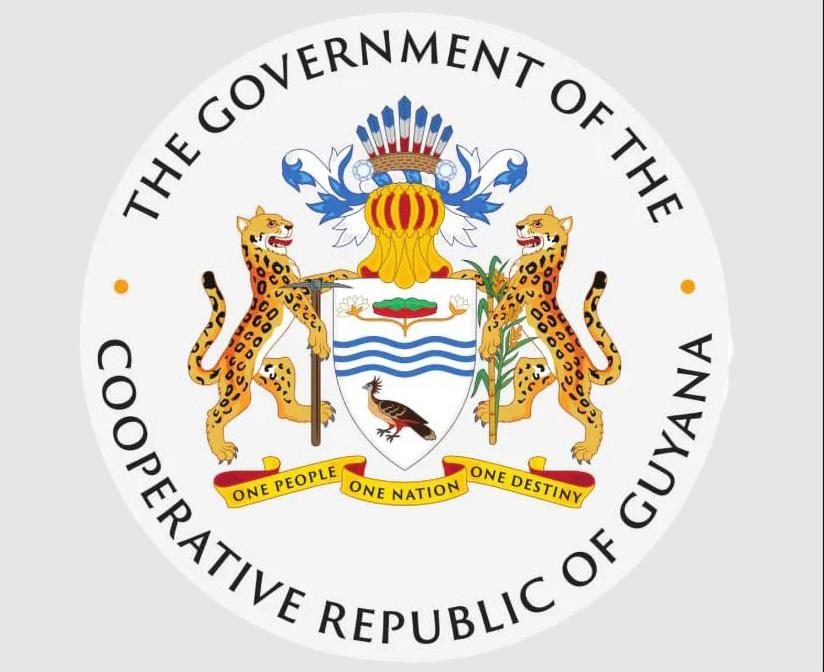
Monetary Fund (IMF), global inflation stands at roughly 5.9 per cent, while some neighbouring countries continue to experience significantly higher rates.
To ease the burden on citizens, the PPP/C administration has implemented a series of targeted social

measures, including:
• Increasing the education grant to $55,000 per child
• Raising the old-age pension to $41,000
• Expanding public assistance and targeted cash transfers, including the $100,000 cash grant
and grants for persons living with disabilities
• Strengthening health voucher programmes
• Removing tolls, reducing electricity bills, providing fuel subsidies, and supporting cooking gas
The IMF earlier this year praised these social transfer policies, noting that they have contributed to higher disposable income and a reduction in Guyana’s poverty rate.
The government has consistently emphasised prudent financial management, framing its anti-poverty and social welfare initiatives within a long-term vision of sustainable development rather than short-term gains.
Through a combination of public service reforms, digital government platforms, and strategic social interventions, President Ali’s administration is aiming to ensure that Guyana’s prosperity reaches every citizen, laying the groundwork for a more equitable and resilient society.

The CARICOM Private Sector Organisation (CPSO) has warned that Member States could achieve annual savings of US$1.3 billion by reducing dependence on US imports, particularly in light of escalating reciprocal tariffs that threaten to widen the region’s trade deficit.
The warning came during a hybrid forum on September 10 titled “De-risking CSME Imports: Examining the Scope for Goods Market Fulfillment from Non-Traditional Sources,” hosted in collaboration with the Eastern Caribbean Central Bank (ECCB) at the Bank’s Headquarters in St. Kitts and Nevis.
CPSO CEO and Technical Director Dr. Patrick Antoine presented findings from a comprehensive study highlighting troubling trends in CARICOM’s goods trade
with the United States. The deficit increased by roughly US$200 million between 2022 and 2023, followed by a further US$300 million rise between 2023 and 2024. Projections suggest an additional US$500 million expansion by 2025, even before accounting for the effects of new tariffs.
Dr. Antoine explained that the US’s recent imposition of 15% reciprocal tariffs on goods from Trinidad and Tobago and Guyana could result in a projected export revenue loss of US$653.6 million. “While trade openness supports economic activity and consumer welfare, over-dependence on a single source of imports clearly does not benefit us,” he said.
The study found that nearly 70% of CARICOM’s final imported goods, valued at US$7.7 billion, originate from the United States.
CPSO Chairman Gervase




President Dr. Mohamed Irfaan Ali has received an outpouring of congratulatory messages from the international community following his re-election in Guyana’s General and Re-gional Elections held on September 1, 2025. Leaders and diplomatic missions from the United
ana’s continued growth and development re-mains strong and unwavering.”
The European Union (EU) echoed similar sentiments, praising the peaceful conduct of the elections and the role of the Guyana Elections Commission (GECOM) in ensuring a credible process.

States, European Union, China, India, and the United Kingdom extended warm wishes while pledging to deepen bilateral cooperation with Guyana.
The United States Embassy in Georgetown, in a statement posted on its official Facebook page, commended the Organization of American States (OAS) and other international ob-servers for their impartial monitoring of the polls, which it said contributed to transparency and accountability.
The Embassy reaffirmed Washington’s commitment to Guyana’s growth, noting: “Our commitment to Guy-
and in-clusive economic growth under its Global Gateway Initiative
“The European Union greatly values its long-standing and multifaceted partnership with Guyana, a relationship built on the shared principles of democracy, human rights, and the rule of law,” its statement read.
to establish diplomatic ties with China more than 53 years ago.
He underscored the progress made through practical cooperation and pledged to deepen collaboration under the Belt and Road Initiative. Presi-dent Xi noted his readiness to work with President Ali to advance bilateral ties
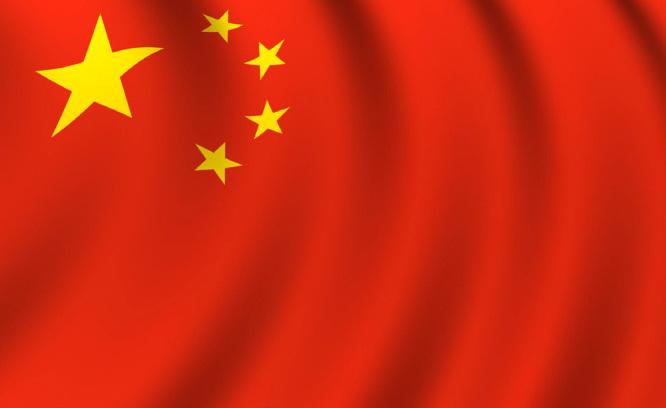
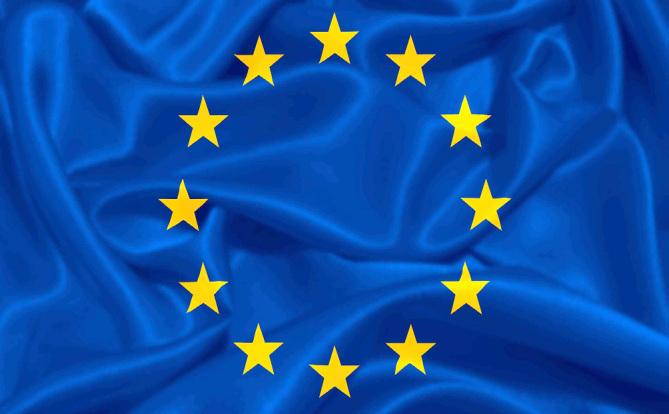
The EU reaffirmed its longstanding partnership with Guyana, stressing its com-mitment to areas such as sustainable development, climate change adaptation,
From Beijing, Chinese President Xi Jinping highlighted the historic nature of Guyana-China relations, recalling that Guyana was the first Caribbean nation
congratulated President Ali and the People’s Progressive Party/Civic (PPP/C) on their electoral victory.
Modi emphasized the historical and cultural connections between Guyana and India, stating: “I look forward to further strengthening India-Guyana partner-ship anchored in strong
Ali, the PPP/C, and the people of Guyana for what it described as a successful and peaceful election.
The UK commended GECOM, party agents, observers, and security ser-vices for their role in ensuring a smooth process, while also encouraging the government to address challenges


to “new heights” for the benefit of both peoples.
Indian Prime Minister Narendra Modi, in a message posted on his official X (formerly Twit-ter) account,
and historical people-to-people ties.”
Meanwhile, the British High Commission in Georgetown extended congratulations to Pres-ident
related to accessibility for the elderly and persons with disabilities.
“As a friend of Guyana and its people, the UK stands ready to support these efforts, and looks forward to deepening the bonds of friendship that bind our two nations in the years ahead,” the statement added.
The wave of congratulatory messages underscores Guyana’s growing importance on the global stage as the country pursues an ambitious developmental agenda, backed by its ex-panding partnerships with key international allies.

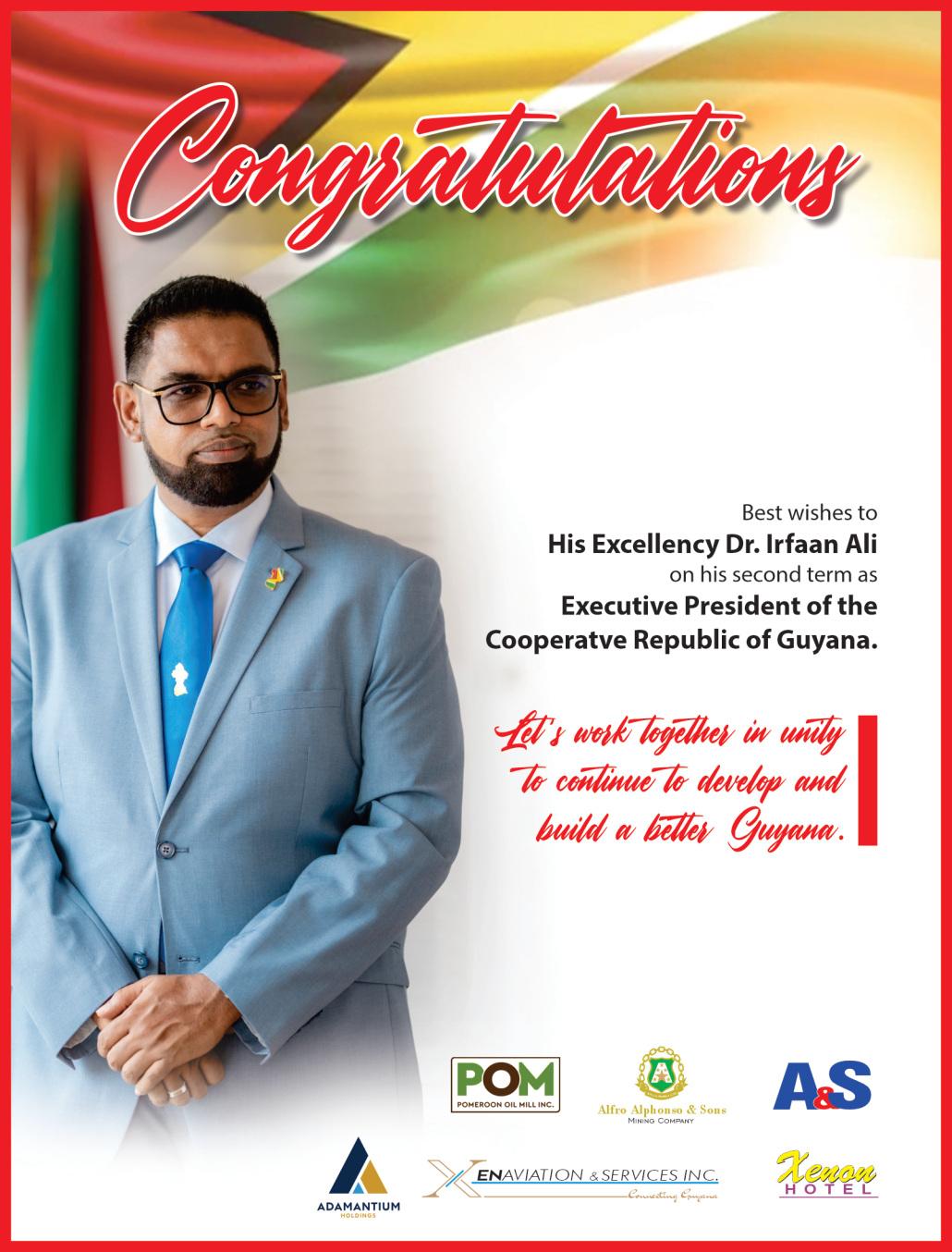


sources over 60% of imports from the US, while St. Kitts and Nevis imports between 47% and 51% from its northern neighbour.
The CPSO highlighted that tariffs could trigger cascading effects, such as duties on goods entering the US before transshipment to the Caribbean, which would amplify inflationary pressures and raise business and living
costs throughout the region.
The Eastern Caribbean Currency Union (ECCU) faces particular vulnerability, sourcing 44.4% of imports from the US, largely finished goods with limited opportunities for value-added production.
To mitigate risks and strengthen regional competitiveness, the CPSO recommended diversifying import sources. The study analysed 1,251 product lines valued at over US$9.1 billion and identified significant potential savings, including:
• 32% of non-fuel goods, including food products, could be sourced more cost-effectively from alterna-
tive markets
• 23% of mineral fuels could be imported at lower cost
• Overall, 94.7% of non-fuel imports and 85.8% of total imports (including fuel) could be sourced competitively from other countries
Promising alternative markets include Malaysia, Brazil, the Netherlands,

Spain, Turkey, South Africa, Estonia, Bulgaria, Portugal, and Mexico, with some markets offering goods at nearly half the US price. The largest savings opportunities were identified in machinery and electrical equipment, key sectors for construction and investment.
The study emphasised that improved trade facilitation and port infrastructure are critical to capturing these benefits. Jamaica’s Port Kingston was identified as having the highest regional connectivity, followed by Trinidad and Tobago’s Port of Spain. Many OECS ports, including St. Kitts and Nevis, have limited direct liner connectivity, creating barriers to developing new trade partnerships.
ECCB Governor Timothy Antoine called for leveraging CARICOM’s strategic geo-
FROM PAGE 16A
graphic location between the Americas, Africa, and Europe to develop a bidirectional trade logistics hub, complementing ongoing energy and digital transformation initiatives.
The CPSO concluded that CARICOM must act urgently to diversify both import and export markets, strengthen regional production capacity, and increase competitiveness in key sectors. Strategic responses could unlock significant savings, protect consumers from price volatility, and improve the region’s position in global supply chains.
Dr. Antoine stressed the need for a coordinated regional strategy: “Increasing the competitiveness of CARICOM goods in the US markets, for the cohort of goods that have maintained their market positioning, must continue as part of CARICOM’s strategic response.”


President Dr. Irfaan Ali on Friday met with Permanent Secretaries and Deputy Permanent Secretaries to outline his administration’s vision for the public service and set clear expec-tations for their roles in driving Guyana’s national development agenda during his
second term.
According to a release from the Office of the President, Dr. Ali stressed that the government will move swiftly to modernise service delivery through a fully digitised framework, one that prioritises customer service, efficiency, transparency, and


measurable results.
“This transformation must remain people-centred, with reliability, efficiency, and timely de-livery as the guiding principles,” the President told the senior public servants.
As part of the first phase of the transition, several key appointments were
confirmed: Sha-ron Roopchand-Edwards as Permanent Secretary in the Ministry of Foreign Affairs, Roger Rogers at the Ministry of Tourism, Industry and Commerce, Duan Ellis at the Ministry of Ag-riculture, and Dr. Erica Forte at the Ministry of Human Services and Social Security.
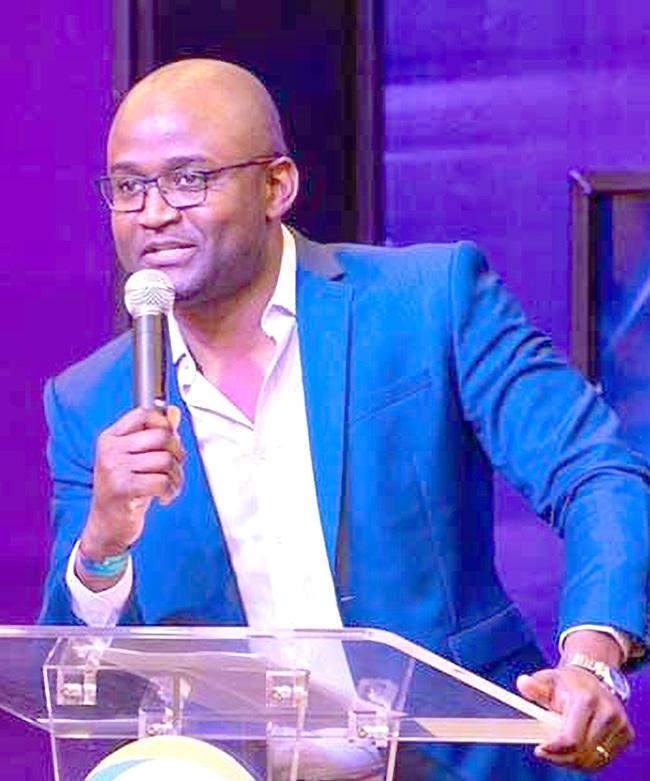
The Head of State said additional announcements on Permanent Secretaries and other senior government functionaries will be made soon, signalling a wider reshaping of leader-ship within the public administration.

At the same time, President Ali is also preparing to unveil a new slate of Presidential Advi-sors who will provide strategic support to the Office of the President and government minis-tries over the next five years.
This publication understands that the team will include seasoned professionals across di-verse fields:
• Shyam Nokta will serve as Presidential Advisor on Climate Change and Biodiversity. Nokta, who played a pivotal role in Guyana’s Low Carbon Development Strategy (LCDS) and the REDD+ partnership with Norway, brings extensive expertise in natural resources, envi-ronment, and climate policy.
• Dr. Mahendra Carpen, a renowned cardiologist, is expected to be named Presiden-tial Advisor on Science and Health Care Modernization. He has led major cardiac and med-ical services in Guyana and across the Caribbean.
• Dr. Kofi Dalrymple, former Dean of the Faculty of Engineering and Technology at the University of Guyana, will advise the Ministry of Education on tertiary education reform, with a focus on TURN TO PAGE 24A




modernising curricula and expanding opportunities.
• Geeta Chandan-Edmond, attorney-at-law and former Member of Parliament, will serve as Senior Advisor to the Government, bringing her legal expertise and parliamentary experience.
• Mischka White-Griffith, an education specialist and former principal of the School of the Nations, will be appointed Chief Planning Officer in the Ministry of Education.
The move reflects the President’s stated commitment to pairing experienced technocrats with political leadership to deliver results in a rapidly transforming economy.
Since taking office in 2020, Dr. Ali has consistently emphasised efficiency, professional-ism, and accountability in public service. With Guyana’s economy expanding rapidly due to its oil and gas resources and renewed investment in traditional sectors such as agriculture, infrastructure, and education, analysts note that effective public sector leadership will be critical in ensuring that growth translates into improved services and opportunities for citizens.
The incoming advisors are expected to play an influential role in shaping policy and guiding reforms as the Ali administration enters a decisive second term.











